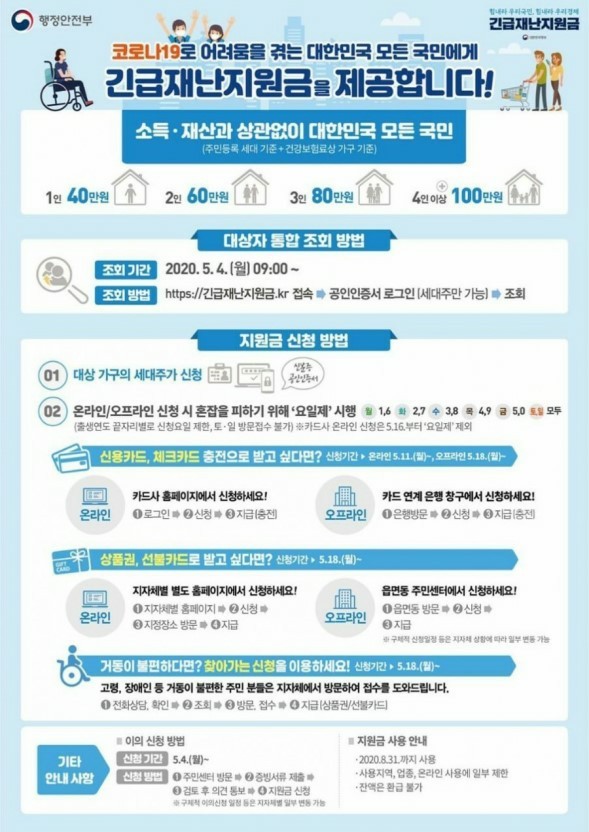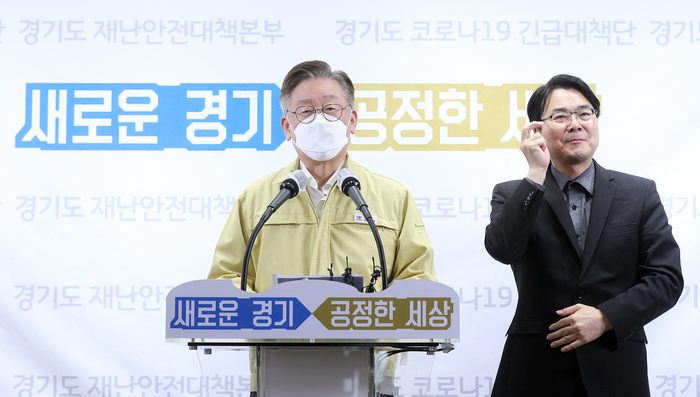On April 3, 2020, the government launched its program for emergency disaster support funding due to the impact of the corona virus infection (COVID-19) is having on the economy. According to the announcement, citizens in the bottom 70 percent income bracket will be eligible for funding support. Households with four or more people will be paid a maximum of 1 million won, while three-person households will receive 800,000, two-person households will receive 600,000, and single person households will receive 400,000. While this program is a welcome reprieve for some, it has left others questioning the effectiveness and expense.
 |
| ▲ A poster includes the way that can applyfor receiving Emergency Disaster Support Funds. (Photo from Ministry ofPublic Administration and Security) |
According to the federal government, support funds will be given to household monthly income will be determined based on the same figure used to determine the health insurance payment made in March. This is different from usual. In the welfare sector, income is usually based on ‘income recognition’ rather than on a simple sum of monthly wages. Income recognition is calculated by adding the total income amount to your total property asset value. However, this takes time to determine, so since the health insurance payment can be easily determined, the government decided to use that data in determining which families will be eligible for support. Overall the emergency disaster support fund is intended to help vulnerable social groups who have been struggling from living difficulties since the corona virus outbreak. They include the self-employed, small business owners, low-income earners and the unemployed. However, due to an overall reduction in demand and consumption, opinions have begun to emerge that cash is needed to support all affected people, not just low-income families, in order to boost economic spending.
Seoul, Gyeonggi Province and other local governments across the country have also come up with measures for emergency disaster support funds to overcome regional economic issues resulting from the virus outbreak. Among them, Jeonju city announced a plan to pay 527,000 won per person to about 50,000 people including irregular and unemployed workers as a form of income support, in order to stabilize their emergency situation. Gangwon province later announced it will pay 400,000 won each of its 300,000 residents, while the Seoul Metropolitan Government said it will provide 300,000 to 500,000 won to 483,000 households with a median income or below in the province, and Gyeonggi will pay 100,000 won per person to all residents.
It is clear from these all these programs that there is a huge range in funding support, that is contingent upon your residence. While there are local governments offering emergency financial aid to all, regardless of their income, others have announced they will provide support dependent on their own defined income standard. The names of the programs also differ from emergency living expenses, to basic income from disasters, and emergency life stabilization funds. These differences in support amounts, qualifications and program names are resulting in strong voices of discontent and confusion among residents.
 |
||
▲ Governor Lee Jae-myung announces the Gyeonggi Emergency Disaster Support Funds. (Photo from Korea Social Welfare News)
|
Some people support the relief, saying it will re-activate the shrinking domestic economy, while others disagree saying it costs too much to support. Furthermore, the standard of the support target is controversial. Some people insist that the government should selectively support citizens who are directly damaged by COVID-19 and the underprivileged. Others insist that since the economic situation is urgent, the government should support all citizens.
The Dankook Herald (DKH) interviewed Kim Hyung-soo, professor in the Dept. of Public Administration to better understand the program and its critics. According to Kim, the problem could be easily solved if the government decided on its philosophy for state affairs. He believes the government should support all citizens because poverty is hierarchical, and COVID-19 is democratic. So, he insisted that no matter how citizens use the emergency disaster support funds, the government should distribute it evenly to all citizens. However, in the small business sector, he objected to overlapping emergency disaster support funds because he sees it as reverse discrimination. Instead, he said that it would be more appropriate to provide development assistance to small businesses to enable them to transform into new industries.
The federal government’s Emergency Disaster Relief Fund will help revive the economy by providing much needed support money to affected persons and should stimulate consumption currently depressed by COVID-19. However, there are limits to programs like these, as the aid will only help recovery in the short term. Many experts say the corona virus will lead us to a new world that no one has experienced before. For example, existing industries that are familiar to us might disappear such as offline pop-up store and that the pattern of our daily lives will change by 180 degrees. In the long run, it may be desirable for various experts and policymakers to invest in innovative and future-oriented industries, so we can ensure we face this new paradigm with success.
박유정, 서채원 dankookherald@gmail.com

 Vote for the Campus Brand Naming!
Vote for the Campus Brand Naming!

![[Campus Magnifier] Let's Surf the Library!](/news/thumbnail/202404/12496_1765_4143_v150.jpg)




